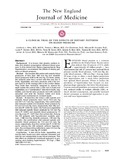| dc.description.abstract | Elevated blood pressure is a common problem in the United States. Recent survey data indicate that 24 percent of U.S. adults — approximately 43 million people — have hypertension and only 47 percent have optimal blood pressure (systolic blood pressure, <120 mm Hg; diastolic blood pressure, <80 mm Hg).1 Among adults 50 years of age or older, a much higher proportion have hypertension and a much lower proportion have optimal blood pressure. Efforts to reduce the prevalence of hypertension have focused on nonpharmacologic approaches that lower blood pressure. Current national guidelines recommend weight control, reduced intake of sodium chloride (salt), reduced alcohol consumption, and possibly increased dietary potassium as nutritional approaches to prevent and treat hypertension.2,3
Other dietary factors may influence blood pressure. Vegetarians tend to have lower blood pressures than nonvegetarians.4 In trials of vegetarian diets, replacing animal products with vegetable products reduced blood pressure in normotensive and hypertensive people.5,6 Aspects of vegetarian diets believed to reduce blood pressure include their high levels of fiber and minerals (such as potassium and magnesium) and their reduced fat content. In observational studies, significant inverse associations of blood pressure with intake of magnesium, potassium, calcium, fiber, and protein have also been reported.7-11 However, in trials that tested these nutrients, often as dietary supplements, the reduction in blood pressure has typically been small and inconsistent.12-18
There are several possible reasons for the discrepancy between the inconsistent results of trials that modified single nutrients and the generally positive results of trials of vegetarian diets and observational studies of diet and blood pressure. The effect of any individual nutrient in lowering blood pressure may be too small to detect in trials. When several nutrients with small blood-pressure–lowering effects are consumed together, however, the cumulative effect may be sufficient for detection. Alternatively, nutrients other than those tested in trials or measured in observational studies may reduce blood pressure. Also, nutrients in dietary supplements may not reduce blood pressure to the same extent as nutrients in food, because of interactions with other dietary components or because of altered bioavailability.
The Dietary Approaches to Stop Hypertension (DASH) trial was a multicenter, randomized feeding study that tested the effects of dietary patterns on blood pressure. As a trial of dietary patterns rather than individual nutrients, DASH tested the combined effects of nutrients that occur together in food. | en |

